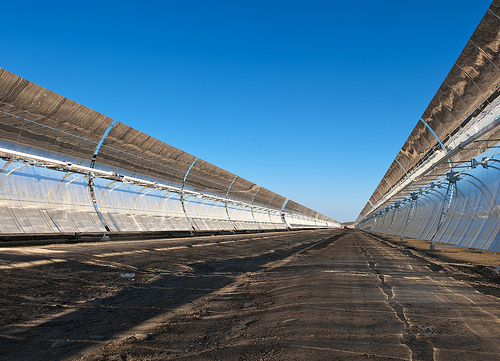Insurer invests in Solar Power, calls for fast action on Climate Change

Due to the lack of progress at the COP15 climate negotiations in Copenhagen Munich Re has decided to increase its commitment in sustainability through investments of up to 2 billion Euros in renewable energy, including the Desertec desert-power project. "We will do our utmost to ensure that Desertec Industrial Initiative GmbH, the Desertec project planning entity, can put forward finished plans in the next three years. Munich Re will, of course, also be involved in their implementation - as an investor and insurer", said Torsten Jeworrek, Munich Re Board member responsible for global reinsurance business.
Munich Re, one of the world's largest insurance companies, has called for substantial greenhouse gas reductions "We need as soon as possible an agreement that significantly reduces greenhouse gas emissions because the climate reacts slowly and what we fail to do now will have a bearing for decades to come." said Torsten Jeworrek.
"It is very disappointing that no breakthrough was achieved at the Copenhagen climate summit in December 2009. At Munich Re, we look closely at a multitude of risks and how best to handle them. Risks that change in the course of time are especially hazardous. Climate change is just such a risk of change." added Torsten Jeworrek.
Shortly after the COP15 talks ended Nikolaus von Bomhard, the Chief Executive Officer of Munich Re, said: "The outcome of Copenhagen has left me somewhat stunned. The 2°C goal agreed with China and India at the G8 summit in summer of this year was merely recognised in Copenhagen, with no pledges made. The major industrial countries, along with China and India, have thus retreated behind the lines already established. At Munich Re, we look closely at a multitude of risks and how to handle them best. Climate change is such a risk, and the need for action is obvious. I therefore find it baffling that so little was achieved during the negotiations in Copenhagen."
Nikolaus von Bomhard called for a rapid resumption of talks with a focus on the major players - USA, Europe including Germany, and China - to get the negotiations moving again. "We need a strict climate agreement, and we need it fast. Climate change is a global problem and a challenge for humankind. If the players do nothing but pursue their national interests, we are headed for a climate catastrophe."
In the Munich Re assessment of the past year there were no major catastrophes in 2009, but the total number of destructive natural hazard events was 850 above the 770 per annum average for the last ten years. The North Atlantic hurricane season was very benign with only nine named storms being recorded, three reaching hurricane force.
"However, we should make no mistake: despite the lack of severe hurricanes and other megacatastrophes, there was a large number of moderately severe natural catastrophes. In particular, the trend towards an increase in weather-related catastrophes continues, whilst there has fundamentally been no change in the risk of geophysical events such as earthquakes", said Prof. Peter Höppe, Head of Munich Re's Geo Risks Research.
Desertec Industrial Initiative
Munich Re is one of 12 European companies - 10 German, 1 Spanish and 1 Swiss - that has come together in the Desertec Industrial Initiative, an ambitious solar energy project that could eventually include about 200 plants and require investment of US$400 billion, with contruction over the next 40 years.The Desertec Industrial Initiative is a proposal to use Concentrating Solar Thermal Power (CSP) generation with thermal storage for round the clock baseload power from the Sahara in North Africa. The electricity grids for Europe, Middle East and North Africa would be linked and integrated. High Voltage Direct Current (HVDC) transmission lines which have a loss of power during transmission of about 3% per 1000 km, will link the grids. If seawater is used for coolling the turbines, desalination can be incorporated to produce drinking water.
Under the Desertec proposal 2% of Europe's energy needs will be met by 2020, rising to 17% by 2050. Renewable energy generated in Europe will rise from 8% in 2010, 20% in 2020, to 46% in 2050. Hydro-electric generation will remain stable at 18%, with Fossil fuel energy decreasing from 52% in 2010 to 18% in 2050.
North Africa, South western United States and much of central Australia are ideal locations for CSP, which is seen as a relatively mature technology that can be implemented relatively easily.
Solar thermal power plants have been in use commercially at Kramer Junction in California since 1985. New solar thermal power plants with a total capacity of more than 2000 MW are at the planning stage, under construction, or already in operation.
For Australia, DESERTEC-Australia has proposed that between 2010 and 2020 Australia could sideline coal-fired output and replace it with natural gas power and renewables. This would create significant near term greenhouse gas reductions. Australia runs some of the most polluting coal fired power stations in the world and is the highest CO2 emitter on a per capita basis.
Sources
- Munich Re Press release, Dec 29, 2009 - Few major natural catastrophe losses in 2009 General trend confirmed by large number of weather extremes
- News Insurances, Dec 21, 2009 - Munich RE's CEO, Nikolaus von Bomhard stunned by Copenhagen outcome
- Desertec Foundation - www.desertec.org
- Desertec-Australia - Australia 2050: Clean Energy Superpower
- Photo by Worklife Siemens of Solnova 1 plant at Abengoa Solar, near Seville, with a capacity of 50 megawatts - Solnova in Spanien (Creative Commons Licensed)
Get Involved
If you'd like to help with maintaining or developing the website, contact us.
Publish
Publish your stories and upcoming events on Indybay.


